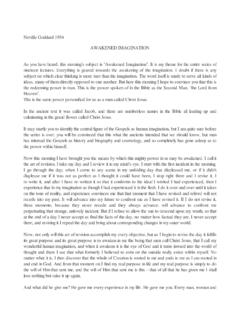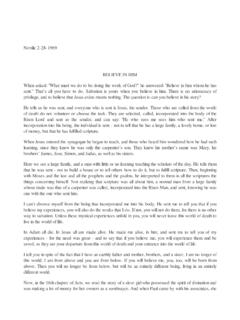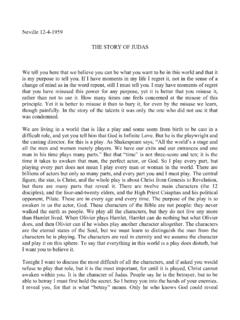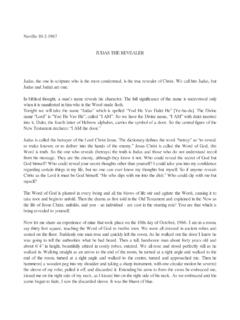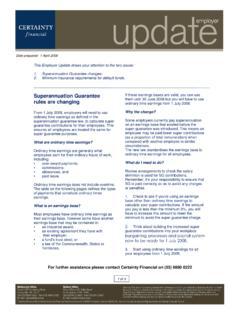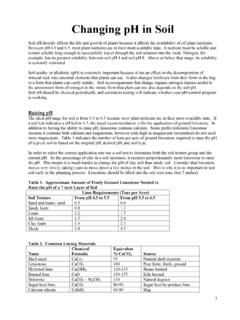Transcription of Changing The Feeling Of I - Neville Goddard Audio …
1 Neville Goddard 1953 Changing THE Feeling OF "I"For the benefit of those who were not present last Sunday, just let me give you a quick summary of thethought expressed here. We claimed that the world was a manifestation of consciousness, that the individual'senvironment, circumstances and conditions of life were only the outpicturing of the particular state ofconsciousness in which that individual abides. Therefore, the individual sees whatever he is by virtue of thestate of consciousness from which he views the world. Any attempt to change the outer world before hechanges the inner structure of his mind, is to labor in vain. Everything happens by order. Those who help orhinder us, whether they know it or not, are the servants of that law, which constantly shapes outwardcircumstances in harmony with our inner nature. We asked you lastSunday to distinguish between theindividual identity and the state the occupy.
2 The individual identity is the Son of God. It is that I speak of youor to you, or speak of myself, I mean really our imagination. That is permanent. It fuses with state andbelieves itself to be the state with which it is fused, but at everymoment of time it is free to choose the statewith which it will be that brings us to today's subject, " Changing the Feeling of I",and I hope I will not get the same reactionthat is recorded in the sixth chapter of the Gospel of John. For we are toldthat when this was given to theworld they all left him, leaving just a handful behind. For when he told them there was no one to change butself, they said this is a hard, hard teaching. It's a hard thing. Who can hear it? For he said, "No man comethunto me save I call him." And then it's recorded when he repeated itthree times they left him, never again towalk with him.
3 And he turned to the few who remained and asked them, "Would you also go?" And theyanswered and said, "To whom would we go ? You have the word of eternal life. 'I In other words, it's somuch easier when I can blame another for my misfortune, but now that Iam told that no man cometh unto mesave I call him, that I am the sole architect of my fortunes and misfortunes, it's a difficult saying, and so it'srecorded "It's a hard saying. Who can hear it? Who can grasp it? And who will believe it?" And so he said,"And now I sanctify myself that they also be sanctified through the truth, for if this is the truth, then there is noone to change, no one to make whole, no one to purify but self."And so we start with the "I" . Most of us are totally unaware of the self that we really cherish. We have nevertaken one good look at the self, so we don't know this self, for the "I" has neither face, form nor figure, but itdoes mold itself into structure by all that it consents to, all that it believes, and few of us know really what wedo believe.
4 We have no idea of the unnumbered superstitions and prejudices that go to mold this inner,formless "I" into a form which is then projected as a man's environment, as the conditions of here, read it carefully when you go home, "No man cometh unto mesave I call him. You didn't chooseme; I have chosen you. No man can take away my life; I lay it down myself . There is no power to take fromme anything that is part of the inner arrangement of my mind. All that you gave me I have kept and none islost save the son of perdition or the belief in God, and because nothing can belost but the belief in loss, I willnot now assume loss of anything you have given me that is good. And so I sanctify myself that they besanctified through the truth".And now, how do we go about Changing the "I". First of all, we must discover the "I" and we do this by anuncritical observation of self.
5 This will reveal a self that willshock you. You will be altogether, I wouldn't sayafraid, but ashamed to admit you've ever known such a lowly had it been God Himself whodrew near in this despicable form, you would have denied him a thousand times before a single cock wouldcrow. You couldn't believe that this is the self that you've carriedaround and protected and excused andjustified. Then you start Changing this self after, by an uncritical observation, you make the discovery of thatself. For the acceptance of self is the essence of the moral problem of the world. It is the epitome of a trueoutlook on life, for it is the sole cause of everything you description of the world is a confession of the self that you do not know. You describe another, youdescribe society, you describe anything, and your description of the thing you observe reveals to one whoknows this law the being you really are.
6 So you must first accept thatself. When that self is accepted, thenyou can start to change. It's so much easier to take the virtues ofthe Gospel and apply them as the word oflife, to love the enemy, to bless those who curse us, and to feed the hungry. But when man discovers thebeing to be fed, the being to be clothed, the being to be sheltered, the greatest enemy of all is that self, thenhe is ashamed, completely ashamed that that is the being, for it waseasier to share with another somethingthat I possess, to take an extra coat and give it to another, but when Iknow the truth it's not that. I start withthe self, having discovered, and start with change of that , let me tell you a story. A few years ago in this city I was giving a series of lectures down near that lake- I can't even recall the name of the lake but it was some Parkview Manor was the place where I spoke, andin that audience was a gentleman who sought an audience before the meeting.
7 And we went across the streetinto the little park there, and he said to me that he had an insoluble problem. I said, "There is no such thing asan insoluble problem. "But", he said, "you do not know my problem. It's not a state of health, I assure you; itis look at the skin that I wear" . I said, "What's wrong with it; it looks lovely to me". He said, "Look at thepigment of my skin. I, by the accident of birth, am now discriminated against. The opportunities for progressin this world are denied me just because of the accident of birth, thatI was born a colored for advancement in every field, neighborhoods that I wouldlike to live in and raise a family Icouldn't move in, where I would like to open up a business I couldn't move into that area."Then I told him my own personal experience, that I came to this country. Well, I didn't have that problem butI was a foreigner in the midst of all Americans.
8 I didn't find it difficult. "Yet", as he reminded me, "but that'snot my problem, Neville . Others have come here speaking with an accent, but they haven't my skin, and Iwas born an American" . Then I told him an experience of mine in New York City. If I were called upon toname a man that I would consider my teacher, I would name Abdullah. I studied with that gentleman for fiveyears. He had the same color skin, the same pigment as this gentleman. He would never allow anyone to referto him as a colored man. He was very proud of being a negro didn't want anymodification of what God hadmade him. He turned to me and he said, "Have you ever seen a picture ofthe Sphinx?" I said, "Yes". He said,"It embodies the four fixed quarters of the universe. You have the lion, the eagle the bull and man. And here isman that is the head. The crown of that creature called the Sphinx,which still defies man's knowledge tounriddle it, was crowned with a human head.
9 And look carefully at thehead, Neville , and you will seewhoever modeled that head must have been a negro. Whoever modeled it had the face of a negro and if thatstill defies man's ability to unravel it, I am very proud that I am anegro." I have seen scientists, doctors,lawyers, bankers, from every walk of life seek an audience with old Abdullah, and everyone Who camethought themselves honored to be admitted to his home and to receivean interview. If he was ever invitedout, and he was, he was always the honored guest. He said, " Neville , you must first start with self. Find self,don't be ashamed ever of the being you are. Discover it and start the Changing of that self".Well, I told this gentleman exactly what Abdullah had taught me,that there was no cause outside of thearrangement of his own mind. If he was discriminated against, it was not because of the pigment of his skin,though he showed me signs as large as all outdoors denying him access to a certain area.
10 The sign is thereonly because in the minds of some men such patterns are formed and theydraw unto themselves what nowthey would condemn; that there is no power outside the mind of man to do anything to man, and he by thearrangement of his own mind, by consenting to these restrictions inhis cradle and being conditioned slowlythrough his youth, waking into manhood believing himself set upon would have to be set upon, but "no mancometh unto me save I call him". So then someone comes to condemn or to praise. They couldn't comeunless I call them. Not a man called Neville , but that secret being that is not called Neville . The secret beingthat is the sum total of all of my beliefs , all of the things that I consent to, that form a pattern ofstructure, thatsecret being draws unto itself things in harmony with itself. Well, that man went away and wrestled withhimself.



